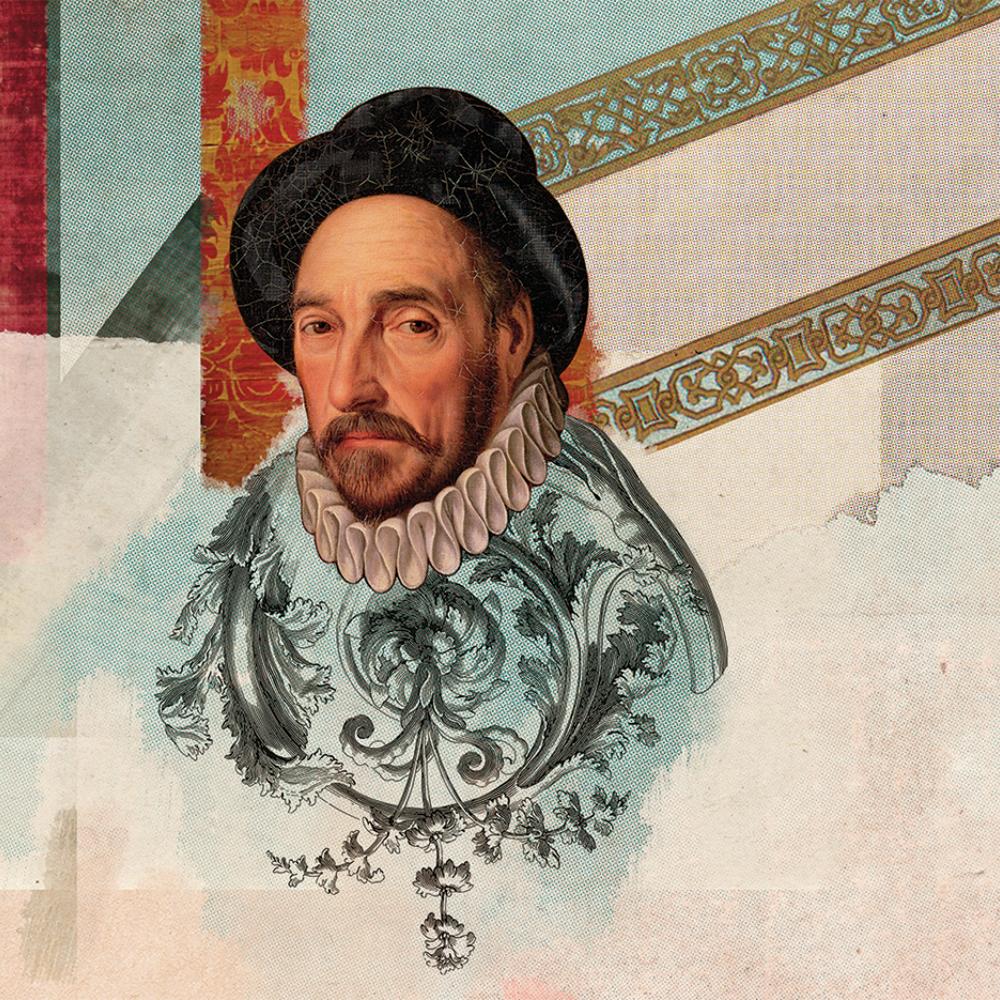In 1837, Ralph Waldo Emerson gave one of the most important speeches in American history, an address at Harvard University in which he urged students to fulfill the country’s political independence by being intellectually and culturally independent, too.
Through his “American Scholar” speech, Emerson suggested that his fellow citizens should test the ideas of the Old World against experience, and not simply embrace them through habit. “It is a mischievous notion that we are come late into nature; that the world was finished a long time ago,” said Emerson. “As the world was plastic and fluid in the hands of God, so it is ever to so much of his attributes as we bring to it.”
Emerson found the courage to question accepted wisdom in many places, but an important model for his critical thinking came, oddly enough, from Michel de Montaigne, an icon of the European literary tradition Emerson regarded so skeptically. In the early days of his career, as Emerson was seeking the best way to think and write, he looked to Montaigne, the sixteenth-century French essayist, as an inspiration. Later, Emerson wrote an essay about his hero, “Montaigne; or the Skeptic.”
Montaigne and Emerson are an unlikely literary pair. Emerson, an often earnest New Englander with a Brahmin’s sense of propriety, once took Walt Whitman on a walk and advised the poet to tone down the “sex element” in Leaves of Grass. Montaigne, by contrast, could be unabashedly frank, mentioning his track record with various enemas (“farted endlessly”) and treating sex with matter-of-fact candor.
That sensibility sometimes left Emerson breathless. “Montaigne is the frankest and honestest of all writers. His French freedom runs into grossness,” Emerson observes, with quite possibly a sigh, “but he has anticipated all censure by the bounty of his own confessions.” Montaigne’s occasional explicitness, although not to Emerson’s taste, seemed to express his willingness to see things clearly.
Emerson first encountered the French writer as a young man. He had inherited a volume of Montaigne’s essays from his late father’s library, but he had neglected it for years, only opening the book one day not long after he graduated from college. Reading Montaigne was a revelation.
“It seemed to me as if I had myself written the book, in some former life, so sincerely it spoke to my thought and experience,” Emerson declared. “I know not anywhere a book that seems less written. It is the language of conversation transferred to a book. Cut these words, and they would bleed; they are vascular and alive. One has the same pleasure in it that he feels in listening to the necessary speech of men about their work, when any unusual circumstance gives momentary importance to the dialogue. For blacksmiths and teamsters do not trip in their speech; it is a shower of bullets.”
Emerson’s feeling of finding himself in Montaigne’s essays has been a common one for Montaigne fans. Shakespeare appears to have read Montaigne’s essays and worked their insights into his plays, so that to watch the Bard is to see Montaigne just beyond the stage lamps, winking with approval. Virginia Woolf compared reading Montaigne to looking at a portrait and seeing your own image. “For thirty years,” Gore Vidal told readers a few years before his death, “I have kept Donald M. Frame’s translation of The Complete Works of Montaigne at, if not bedside, hand. There are numerous interlocking Olympic circles on the maroon binding where glasses were set after I had written some no longer decipherable commentary in the margin or, simply, ‘How true!’”
The late Lewis Thomas, one of America’s celebrated modern essayists, was another admirer. “For the weekend times when there is nothing new in the house to read,” said Lewis, “and nothing much to think about or write about, and the afternoon stretches ahead all bleak and empty, there is nothing like Montaigne to make things better.”
This is all tall praise, indeed, for a writer who seemed to do exactly the opposite of what was required to achieve literary fame. Born in 1533, Montaigne came from a wealthy family and held important government positions, including work as an adviser to three French kings. He studied law and served as a magistrate and mayor of Bordeaux. Even after ostensibly retiring, he continued to keep a hand in public life, mediating France’s religious strife and serving once again as Bordeaux’s mayor.
When Montaigne retreated to his country estate at age thirty-eight, instead of writing about his life at the center of power, he wrote mostly about what he saw from his tower library. The fruits of that period of relative seclusion secured his place in posterity. As the New Yorker’s Jane Kramer has pointed out, every French schoolchild learns the date of Montaigne’s “retirement”—February 28, 1571—because of its significance to the literature of France and, indeed, the world. “He had his books for company,” writes Kramer, “his Muses for inspiration, his past for seasoning, and, to support it all, the income from a large estate, not to mention a fortune built on the salt-herring and wine trades, which, in the last century, had turned his family into a landed gentry.”
At first glance, the musings from a man of leisure didn’t seem the most promising material for a best-seller. Instead of penning an epic poem, a historical narrative, or an imposing treatise on government, a project for which he was eminently qualified, Montaigne decided to simply follow his thoughts wherever they led. The complete edition of his Essays is about thirteen hundred pages, but there’s no obvious plot or design. Topics include everything from sadness to sleep, lying to Cicero, and drunkenness to the pleasure of books. Montaigne even includes a lengthy essay on thumbs, of all things. Like many educated men of the Renaissance, Montaigne looked to Greek and Latin classics for inspiration. “His first tutor spoke only Latin to him, and Montaigne himself spoke no French until he was five years old,” notes scholar Kia Penso. In his writings, Montaigne quotes the Greek commentator Plutarch so often that the ancient historian and moralist presides over the essays like a favored uncle at the dinner table. But while Montaigne, ever the lawyer, leans on precedent when useful in making his case, he also embraces the Renaissance enthusiasm for close personal observation as an avenue to truth. He’s one of the world’s great noticers, his essays suffused with the texture of everyday sensation.
A quick look through the essays turns up one gem after another. “I have never had any trouble except in the management of my own affairs. Epicurus says that to be rich is not the end, but only a change, of worries,” he laments at one point. “Nature seems to have inclined mankind to social intercourse above all else. And its supreme point of perfection, I find, is friendship,” he observes in another passage. Another turn of the page reveals this thought: “I can dine without a tablecloth, but hardly without clean napkins, as the Germans do; for I soil them more than they or the Italians, since I make little use of a spoon or fork. I regret that the royal custom of changing napkins, together with the plates, after every course, is not more widespread.” And then one dips in and finds Montaigne bridging the ageless subjects of sex and death with cutting concision: “Everyone, certainly, flees from seeing a man born, and everyone rushes to see him die. To destroy a man we use a large field in open daylight. But to make a man we sneak into as dark and secluded a corner as we can.”
The quotidian quality of Montaigne’s essays, in fact, is their biggest appeal. They seem so drawn from life that they look effortless. Penso recalls that philosopher Eric Hoffman once tried to share Montaigne’s essays with some acquaintances, to no avail: “One man flipped through the book for a while and handed it back, observing that it was nothing special—anybody could have written it. Montaigne would have liked that.”
When Montaigne changed his mind about a subject, instead of revising his views seamlessly, he’d often just tack an addendum on his previous statement, leaving the original one intact. One can easily imagine a contemporary literary agent surveying this merry mess, then pitching it into the trash can.
If Montaigne doesn’t seem obviously concerned with pleasing an audience, it’s probably because he wrote his essays at least as much for himself as anyone else. Montaigne’s temporary withdrawal from public affairs came about because of what we might today call a midlife crisis. He’d faced some losses that made him wonder about his own mortality and the point of existence. “His firstborn daughter had died at the age of only two months (the first of five to die in infancy),” Montaigne scholar Saul Frampton notes. “His younger brother had been killed, absurdly, tragically, by a blow from a tennis ball. His best friend, Etienne de La Boétie, had died of the plague in his early thirties. And his father, whom he adored, had recently suffered a prolonged and agonizing death from a kidney stone. Moreover, violent religious warfare was spreading across the country, setting light to Montaigne’s region, pitting Catholic against Protestant, father against son, massacre against murder.”
Feeling overwhelmed, Montaigne, a Catholic respected by both sides in the conflict, retreated to his estate near Bordeaux, financially secure enough, as he put it, to “pass what may be left of (my) life already more than half spent.”
Soon Montaigne grew restless. Today, he might have talked to a social worker or sought a prescription for his anxiety, but lacking that option, he improvised his own form of therapy, recording his thoughts on paper. Others had written in the first person before Montaigne, but they typically offered their opinions from positions of authority. Montaigne simply wrote as himself: a guy at the apparent midpoint of his life trying to sort himself out. He called his compositions “essays,” which translates as a trial or attempt, and seemed like a shrewd way to lower expectations. Montaigne offered his prose as a first stab at wisdom, a work in progress rather than an intact philosophical system.
Someone writing randomly about what he’s thinking for hundreds of pages sounds pretty dull, but Montaigne pulls it off. “How does it happen that Montaigne is not ever, not on any of all those pages, even a bit of a bore?” Thomas asks, and then answers his own question: “He likes himself, to be sure, but is never swept off his feet after the fashion of bores.”
While boredom grows from the same thing again and again, Montaigne expresses his own personality—and, by extension, the rest of humanity—as a richly varied organism: “I contain in some fashion every contradiction, as the occasion provides. Bashful, insolent, chaste, lustful, talkative, silent, clumsy, fastidious, witty, stupid, morose, gay, false, true, wise, foolish, liberal, greedy, prodigal: I see myself somewhat all of this as I turn myself around—and so will everyone if he does the like.”
The titles of Montaigne’s essays are often mere launching pads for compositions that, like human thought or table talk, allow frequent and seemingly accidental changes of scene or subject. One of Montaigne’s lengthiest essays, “An Apology for Raymond Sebond,” is typical of his technique. Although ostensibly a solemn defense of a religious philosopher of the period, the essay encompasses much more. “Raymond Sebond is the least of concerns; having given a dutiful nod to his father and Sebond in the first paragraphs, and an obligatory homily on the usefulness of reason for arriving at truth, Montaigne simply turns his mind loose and writes whatever he feels like writing,” said Thomas. “Mostly, he wants to say that reason is not a special, unique gift of human beings, marking us off from the rest of Nature. Bees are better at organizing societies. Elephants are more concerned for the welfare of other elephants, and cleverer at figuring things out; they will fill up the man-dug elephant trap with timber and earth in order to bring the trapped elephant to the surface. . . . It is the greatest fun.”
Not everyone has found Montaigne’s penchant for digression so charming. In the 1930s, scholar Marvin Lowenthal undertook one of the more eccentric projects in literary history, deconstructing Montaigne’s far-flung observations, then reassembling them through an elaborate cut-and-paste job into a standard memoir, The Autobiography of Michel de Montaigne. It’s a charming read, but Lowenthal treats Montaigne’s meandering style as a lapse to be repaired rather than a method to be explored.
Woolf, though, suggested that Montaigne’s improvising sensibility was a deft expression of how the human mind actually works. She reminded readers that this kind of thing is much easier said than done.
There is, in the first place, the difficulty of expression. We all indulge in the strange, pleasant process called thinking, but when it comes to saying, even to someone opposite, what we think, then how little are we able to convey! The phantom is through the mind and out of the window before we can lay salt on its tail, or is slowly sinking and returning to the profound darkness which it has lit up momentarily with a wandering light. . . . It is for this reason that Montaigne stands out from the legions of the dead with such irrepressible vivacity. We can never doubt for an instant that his book was himself.
“Montaigne’s writing could . . . be said to be the first sustained representation of human consciousness in Western literature,” said Frampton. “This is not to say that people had been unconscious in the periods before, or that accounts of individual lives had not been written, such as by Augustine or Abelard. But no one had paid such attention to the actual experience of living, or seen life as providing a moral lesson—in justifying political and religious tolerance and providing a reason to continue to live.”
If Montaigne’s essays seem revolutionary, it’s perhaps because they were born of revolutionary times. With the emergence of the printing press, Montaigne had more books at his fingertips than many earlier readers might have seen in a lifetime, a reality that greatly empowered him to indulge his curiosity. Montaigne’s intimate, first-person narrative of a mind sorting itself out seemed to reflect a growing acknowledgment among Renaissance thinkers that personal intuition, and not just institutional orthodoxy, could be a path to knowledge. That idea, shimmering throughout Montaigne’s essays, obviously resonated with Emerson, a Transcendentalist who suggested that individuals could have a direct relationship with the cosmos. In this way, Montaigne, the friend of French kings, expressed the early stirrings of a democratic spirit that would, two centuries later, drive the American and French revolutions.
While Montaigne was scribbling away at his desk, exploration of the New World was dramatically enlarging the globe’s known boundaries. “It is no wonder that Montaigne and his contemporaries—like Shakespeare and Cervantes, or Copernicus and Galileo in science were so brilliantly glib—they had brand new material to write about!” author Hilary Masters notes. “To fly to the dead orb of the moon and return is an amazing feat but only that. On the other hand, to return with stories of an alter world populated with people just like us, who are going about their odd religions, raising zinnias and putting the Julian calendar into stone steps—now, that’s the stuff of supermarket tabloids! Some inspiration! It is like the past catching up with the present to make an entirely different here and now.”
Montaigne was fascinated by what lands across the Atlantic could teach him. In “On the Cannibals,” he considers the cannibals of Brazil and suggests that these man-eaters might be more ethically pure than residents of the Old World, a radical notion within European society. “I am sometimes seized with irritation,” he wrote, “at their not having been discovered earlier, in times when there were men who could have appreciated them better than we do.”
That’s pure Montaigne—the bracingly subversive thought that seems delivered on the fly, as topical as a sound bite. The continuing appeal of Montaigne, in fact, is that he can seem urgently contemporary. One can read him randomly, too, as if web-surfing, confident that any page will yield something pungent, pithy, or profound. “You may wander about almost at will in Montaigne,” literary critic Clifton Fadiman remarked. “He should be read as he wrote, unsystematically.”
As Thomas observed in the 1970s, “It is one of the most encouraging aspects of our civilization that Montaigne has never gone out of print.” Some four decades later, the appeal of the man who essentially invented the personal essay remains as strong as ever. Shakespeare’s Montaigne, a selection of essays from the Elizabethan translation of Montaigne by John Florio, appeared in 2014. More modern and accessible English translations of Montaigne’s essays by Donald Frame and M. A. Screech still sell well. In recent years, two popular studies of Montaigne by Frampton and Sarah Bakewell have promised to inspire a new generation of readers. “Although the Essays present a different facet to every eye, everything in them is united in that one figure: Montaigne,” Bakewell writes. “This is why readers return to him in a way they do to few others of his century, or indeed to most writers of any epoch. The Essays are his essays. They test and sample a mind that is an ‘I’ to itself, as all minds are.”




